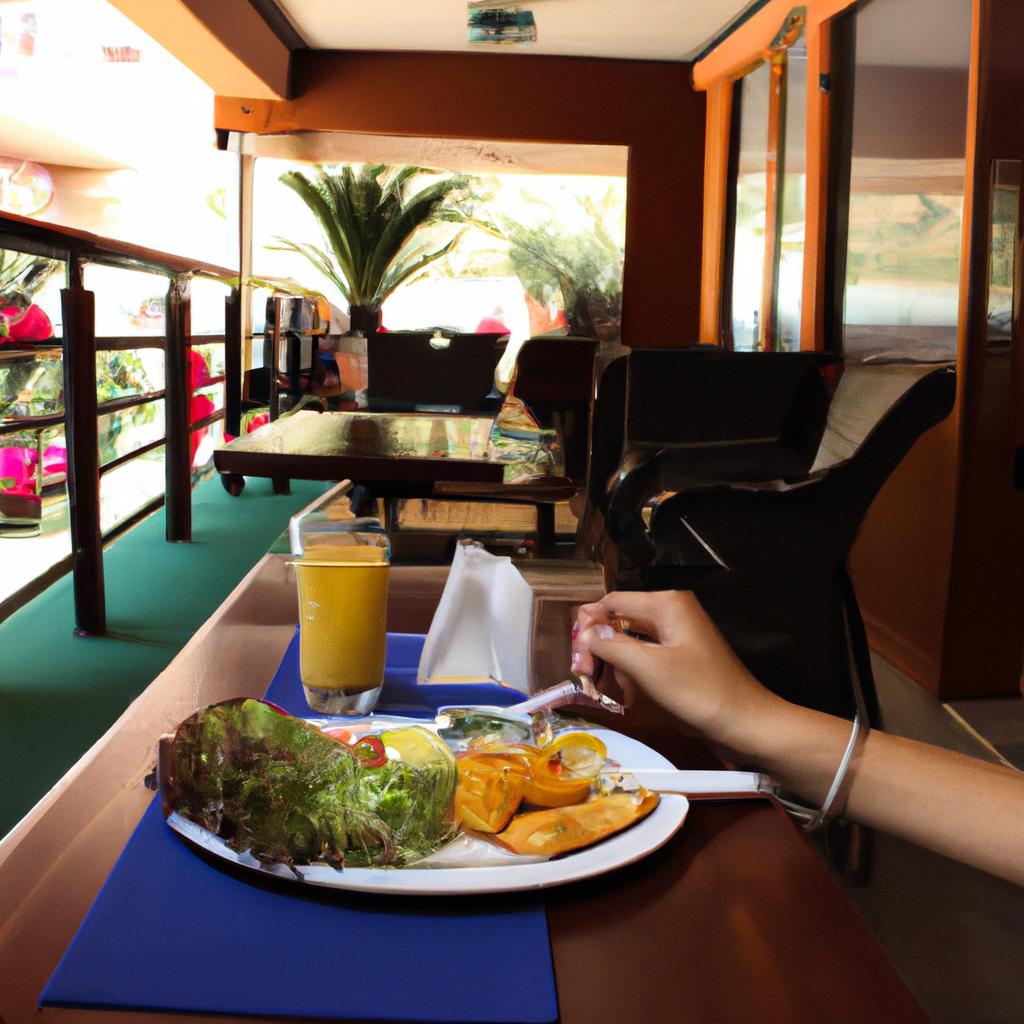Introduction
Hostels have gained popularity as budget accommodations for travelers seeking affordable options for dining and lodging. These establishments provide a unique experience that goes beyond the mere provision of basic amenities, offering communal spaces and vibrant social atmospheres designed to foster interaction among guests from different backgrounds. For instance, imagine a young backpacker embarking on a solo journey through Europe who finds herself in Barcelona. Instead of opting for an expensive hotel, she decides to stay at a hostel located in the heart of the city. This decision not only allows her to save money but also enables her to connect with fellow travelers, exchanging stories, recommendations, and even forming lifelong friendships.
The rise of hostels can be attributed to several factors. Firstly, affordability is a key advantage they offer compared to traditional hotels. With their shared dormitory-style rooms and communal facilities such as kitchens and lounges, hostels are able to provide accommodation at significantly lower prices than hotels or guesthouses. This makes them particularly attractive for budget-conscious individuals or those looking for longer stays without breaking the bank. Secondly, hostels cater specifically to the needs and preferences of adventurous travelers seeking cultural immersion and authentic experiences. By promoting social interaction through organized activities like group outings or game nights, these establishments create an environment conducive to forming connections and friendships. This social aspect sets hostels apart from hotels, where guests often have limited opportunities for interaction with fellow travelers. Moreover, the laid-back and casual atmosphere of hostels appeals to a younger demographic who value spontaneity and flexibility in their travel experiences.
In addition to affordability and socialization, many hostels also offer convenient locations in popular tourist destinations. By situating themselves in prime areas within cities or close to major attractions, hostels provide easy access to sightseeing, dining, and entertainment options. This allows guests to make the most of their time exploring a new destination without having to spend excessive amounts on transportation or waste time commuting from distant accommodations.
Despite these advantages, it is essential for travelers considering hostel stays to do thorough research before making a booking. While many hostels maintain high standards of cleanliness, security, and comfort, there can be variations in quality among different establishments. Reading reviews from previous guests can provide valuable insights into the overall experience offered by a particular hostel.
In conclusion, hostels have become an appealing option for budget-conscious travelers seeking affordable accommodations that also foster social interaction and cultural immersion. With their unique blend of affordability, convenience, and vibrant communal atmospheres, hostels provide an alternative way to experience travel that goes beyond merely finding a place to sleep. Whether you’re a solo backpacker looking for companionship or simply someone who wants to stretch their travel budget further, staying at a hostel may just be the perfect choice for your next adventure.
Types of Rooms in Hostels
Imagine you are a traveler on a tight budget, exploring the adventurous streets of Barcelona. You find yourself in need of affordable accommodation that does not compromise comfort and convenience. This is where hostels come into play, offering an array of room options to suit various needs.
Hostels typically provide different types of rooms to cater to diverse preferences and budgets. One common option is dormitory-style rooms, which consist of multiple beds in shared spaces. These communal rooms foster social interactions among guests from all walks of life, creating a vibrant atmosphere filled with interesting stories and cultural exchanges.
In addition to dormitories, many hostels also offer private rooms for those seeking more privacy or traveling as couples or families. These cozy retreats often feature comfortable beds and basic amenities such as en-suite bathrooms or shared facilities like communal showers. Private rooms allow travelers to enjoy tranquility while still benefiting from the lively hostel environment.
To further enhance your understanding, consider the following bullet points:
- Dormitory-style rooms encourage social interaction among guests.
- Private rooms offer increased privacy without sacrificing the hostel experience.
- Both room types can be equipped with essential amenities.
- Pricing varies depending on room type and location.
| Room Type | Description | Amenities |
|---|---|---|
| Dormitory | Shared space with multiple beds | Lockers, reading lights |
| Private | Single or double occupancy | En-suite bathroom, towels provided |
By providing these diverse room options, hostels aim to accommodate travelers’ varying needs and desires. Whether you seek adventure through new friendships formed in a bustling dormitory or prefer quiet solitude within a private sanctuary, hostels have something suitable for everyone.
Transitioning smoothly into our next section about the benefits of staying in a hostel, let us now explore how choosing this type of accommodation can enhance your travel experience.
Benefits of Staying in a Hostel
In the previous section, we discussed the various types of rooms that can be found in hostels. Now, let’s delve into the benefits of staying in a hostel and why it is an attractive option for budget-conscious travelers.
Imagine you are a backpacker on a tight budget who wants to explore a vibrant city like Barcelona. You stumble upon a charming hostel located right in the heart of the city. The receptionist warmly welcomes you and shows you to your dormitory-style room, where you will be sharing with fellow travelers from different parts of the world. This experience encapsulates what staying in a hostel is all about – affordability, community, and cultural exchange.
Here are some key reasons why staying in a hostel can enhance your travel experience:
- Affordability: One of the most significant advantages of staying in a hostel is its affordability compared to other lodging options such as hotels or vacation rentals. With lower rates per night, hostels provide excellent value for money, allowing travelers to stretch their budgets further.
- Community Atmosphere: Hostels foster an inclusive environment that encourages social interaction among guests. By sharing communal spaces such as kitchens, lounges, or common areas, travelers have ample opportunities to connect with like-minded individuals from diverse backgrounds. These interactions often lead to friendships and lifelong memories.
- Local Insights: Many hostels employ knowledgeable staff members who are passionate about their city or region. They can offer valuable recommendations on local attractions, hidden gems, and even insider tips on where to find the best street food or live music venues.
- Flexibility and Convenience: Hostels cater to the needs of modern travelers by providing flexible check-in times, luggage storage facilities, laundry services, and 24-hour front desk assistance. Such conveniences ensure that guests can make the most out of their stay without feeling restricted by rigid schedules.
To illustrate these points further, consider the following table showcasing how staying in a hostel can positively impact your travel experience:
| Benefits of Staying in a Hostel |
|---|
| Affordability |
| Community Atmosphere |
| Local Insights |
| Flexibility and Convenience |
As you can see, hostels offer more than just cost-effective accommodations. They create an inclusive community that enables travelers to forge connections while gaining valuable insights into the local culture.
So pack your bags as we embark on our journey through the realm of budget-friendly hospitality.
Popular Hostel Chains
Imagine arriving at a hostel in a vibrant city, tired from your journey but excited to explore. As you check-in, you notice the communal areas buzzing with activity – travelers from different parts of the world engaging in lively conversations, sharing travel tips and stories. This is just one example of the social aspect that sets hostels apart from traditional accommodations.
Hostels foster a sense of community where solo travelers can find companionship and create lasting memories. Here are some reasons why the social atmosphere of hostels makes them an attractive choice for budget-conscious globetrotters:
-
Cultural Exchange Opportunities:
- Interacting with fellow travelers allows you to learn about different cultures firsthand.
- Engaging in conversations with people from diverse backgrounds broadens your perspective.
- Sharing meals or participating in hostel-organized activities provides opportunities for cultural exchange.
-
Networking Possibilities:
- Meeting fellow travelers can lead to valuable connections and potential future travel partners.
- Exchanging contact information opens up possibilities for reconnecting and planning future trips together.
- Building a network within the traveler community enables access to insider tips and recommendations.
-
Enhanced Safety:
- Many hostels have 24/7 reception desks staffed by knowledgeable locals who can provide assistance if needed.
- The presence of other guests creates a sense of security, especially when traveling alone.
- Participating in group activities organized by the hostel helps ensure safety while exploring unfamiliar destinations.
-
Budget-Friendly Atmosphere:
| Benefits | Description |
|---|---|
| Cost-effective Accommodation | Hostels offer affordable rates compared to hotels or private rentals. |
| Shared Kitchen Facilities | Access to communal kitchens allows guests to prepare their own meals, reducing dining expenses. |
| Free Amenities | Some hostels provide complimentary amenities such as Wi-Fi, breakfast, or guided tours. |
| Discounts and Deals | Many hostels offer special discounts or deals for long-term stays, further reducing costs. |
In conclusion, the social aspect of staying in a hostel adds value beyond just cost savings. It provides an avenue for cultural exchange, networking opportunities, enhanced safety measures, and a budget-friendly atmosphere. The communal environment fosters connections among travelers from all walks of life, making hostels an attractive choice for those seeking more than just a place to sleep.
Moving forward, let’s explore some tips for finding the best hostel that suits your specific needs and preferences.
Tips for Finding the Best Hostel
Transitioning from the previous section on popular hostel chains, let’s now explore some useful tips for finding the best hostels. To illustrate these tips, we will consider a hypothetical scenario where a traveler named Sarah is planning a budget trip to Europe and wants to find affordable and comfortable accommodations.
Firstly, it is important for Sarah to research different hostel options in her desired destination. She can use various online platforms that provide reviews and ratings from fellow travelers. By reading through these reviews, she can get an idea of the quality of service, cleanliness, and overall atmosphere of each hostel. Furthermore, Sarah should also consider the location of the hostels in relation to her planned activities, as this can greatly impact convenience during her stay.
Secondly, Sarah should carefully assess the facilities offered by each hostel she considers. While budget accommodations may not offer all the amenities found in hotels, there are certain key features that can enhance her experience. For example, common areas such as lounges or kitchens allow guests to socialize with other travelers and save money by preparing their own meals. In addition to socializing opportunities, free Wi-Fi access and secure lockers are essential for many modern-day travelers.
Next, Sarah must take into account her personal preferences when selecting a hostel. Some travelers prefer smaller dormitory-style rooms while others might opt for private rooms if they desire more privacy. Moreover, considering factors such as noise level policies and age restrictions (if applicable) can help ensure a peaceful environment that aligns with individual preferences.
To summarize some crucial points:
- Research different hostels: Utilize online platforms to read reviews and gather information about various hostels.
- Assess facilities: Consider common areas like lounges and kitchens, along with services like free Wi-Fi access and secure lockers.
- Personal preferences matter: Take into consideration room types available (dormitories or private), noise level policies, and any age restrictions imposed.
By following these tips, Sarah can find the best hostel that suits her needs and preferences. In the subsequent section, we will explore some common facilities typically found in hostels to further assist travelers like Sarah in their decision-making process.
Common Facilities in Hostels
Transitioning from the previous section on finding the best hostels, let us now delve into the common facilities and services that are typically offered in these budget accommodations. To illustrate this, let’s consider a hypothetical scenario where Sarah, a solo traveler on a tight budget, is looking for an affordable hostel to stay at during her trip to Barcelona.
Hostels provide a range of facilities and amenities that cater to the needs of travelers like Sarah. Firstly, most hostels offer dormitory-style rooms with bunk beds, allowing guests to share accommodation with fellow travelers. This not only helps keep costs down but also provides an opportunity for socializing and making new connections. In addition to dormitories, some hostels may have private rooms available for those seeking more privacy or traveling in groups.
To enhance the overall experience for their guests, many hostels also provide communal areas such as lounges or common rooms. These spaces often feature comfortable seating arrangements, entertainment options like board games or televisions, and sometimes even libraries stocked with books for leisurely reading. Such communal areas foster a sense of community among guests and create opportunities for interaction and cultural exchange.
Furthermore, hostel facilities commonly include shared kitchen areas where guests can prepare their meals. These self-catering spaces enable travelers to save money by cooking their own food instead of eating out every meal. It also offers them flexibility in terms of dietary preferences or restrictions. Sarah could purchase groceries from nearby markets and whip up her favorite dishes while getting acquainted with other travelers who might be sharing the same space.
Here is a bullet point list highlighting the benefits of hostel facilities:
- Affordability: Hostels offer budget-friendly accommodation options.
- Socialization: Communal areas encourage interactions with fellow travelers.
- Flexibility: Self-catering kitchens allow guests to cook according to personal preferences.
- Connection: The community-like atmosphere fosters a sense of belonging and cultural exchange.
Additionally, hostels often provide various services to cater to their guests’ needs. These may include 24-hour reception desks with multilingual staff who can assist travelers with check-ins, bookings, and recommendations for local attractions or activities. Some hostels may also offer luggage storage facilities, laundry services, bicycle rentals, or even organized tours or events within the city.
In conclusion, hostels offer more than just affordable lodging options; they provide an array of facilities and services that enhance the overall travel experience. From communal spaces that foster socialization to shared kitchens promoting cost-effective dining solutions, these budget accommodations are designed to meet the diverse needs of travelers like Sarah.
Table: Hostel Services
| Services | Description |
|---|---|
| Reception Desk | Staffed 24/7 for guest assistance |
| Luggage Storage | Secure storage space for guests’ belongings |
| Laundry | On-site laundry facilities or access to nearby laundromats |
| Bike Rentals | Rent bicycles for exploring the surroundings |
Transitioning into the subsequent section about “Activities and Events in Hostels,” let us now turn our attention towards the vibrant experiences available within these dynamic establishments.
Activities and Events in Hostels
Section H2: Activities and Events in Hostels
In addition to providing common facilities, hostels also offer a wide range of activities and events that cater to the diverse interests of their guests. These engaging experiences not only enhance the overall stay but also foster social interactions among travelers. Let’s explore some of the exciting activities and events commonly found in hostels.
Paragraph 1:
To illustrate the variety of activities offered, let us consider a hypothetical scenario where you find yourself staying at a vibrant hostel located in a bustling city. The hostel organizes regular walking tours led by local guides who provide insightful commentary about historical landmarks and hidden gems within the city. These tours allow guests to immerse themselves in the local culture while meeting fellow travelers along the way. Additionally, themed nights are organized, such as movie nights showcasing regional cinema or cultural exchange evenings where guests can participate in traditional music and dance performances.
Paragraph 2:
Hostels often curate special events that encourage interaction among guests. These events can include cooking classes where participants learn how to prepare local delicacies under the guidance of experienced chefs. Such hands-on sessions create an opportunity for cultural exchange, as guests share their culinary traditions with one another. Furthermore, language exchange programs enable individuals from different countries to practice speaking foreign languages together, fostering cross-cultural understanding and friendships.
- Engage in lively pub crawls through popular nightlife areas
- Collaborate with other guests on community service projects
- Participate in outdoor adventure excursions like hiking or kayaking trips
- Join game nights featuring board games or group competitions
Table (3 columns x 4 rows):
| Activity | Description | Benefits |
|---|---|---|
| Walking Tours | Guided tours exploring notable attractions | Discover hidden gems; connect with locals |
| Cooking Classes | Interactive sessions to learn regional culinary skills | Cultural exchange; new cooking techniques |
| Language Exchange | Practice foreign language skills with fellow travelers | Cross-cultural communication; make international friends |
| Pub Crawls | Group outings to popular bars and clubs | Socialize with other guests; experience local nightlife |
Paragraph 3:
These activities and events not only add value to the hostel experience but also contribute to a sense of community among guests. The inclusive nature of these offerings fosters connections, allowing individuals from diverse backgrounds to come together and create lasting memories. By participating in such activities, travelers can enhance their overall stay while immersing themselves in the vibrant energy that hostels exude.
By incorporating a range of engaging activities, hostels ensure that guests have an enriching and memorable stay. From walking tours to language exchanges, these experiences facilitate cultural immersion and foster social interactions, making hostels more than just budget accommodations.




